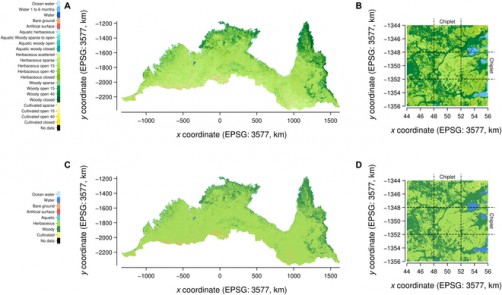Researchers from The University of Melbourne have unveiled a groundbreaking deep learning framework named Themeda that significantly improves the prediction of land cover changes, particularly in savanna ecosystems. Published in the Journal of Remote Sensing on September 11, 2025, the framework combines advanced neural network architectures with extensive satellite observations to achieve unprecedented accuracy in forecasting land cover dynamics across northern Australia.
Land cover change is a critical issue impacting erosion, water quality, fire regimes, and habitat loss. Despite advancements in remote sensing technologies, forecasting these changes has remained complex due to the integration of various environmental factors and the temporal variability inherent in ecosystems. Savannas, which constitute approximately one-sixth of Earth’s land surface, pose unique challenges for modeling due to their seasonal rainfall patterns, frequent fires, and diverse vegetation.
Themeda’s Innovative Approach
Themeda employs a novel combination of ConvLSTM and a new Temporal U-Net design to process data at multiple scales, effectively integrating 23 land cover classes with environmental predictors such as rainfall, temperature, fire scars, soil fertility, and elevation over a span of 33 years from 1988 to 2020. In rigorous validation tests, Themeda achieved an impressive 93.4% accuracy for FAO Level 3 categories, far exceeding the persistence baseline of 88.3%. At regional levels, it reduced prediction errors nearly tenfold compared to existing methods, with a Kullback–Leibler divergence as low as 1.65 × 10−3.
The model’s ability to generalize to unseen years and regions demonstrates its robustness, although extreme conditions, such as the particularly hot and dry season of 2019, posed challenges for prediction accuracy. The probabilistic outputs not only offer pixel-level classifications but also valuable insights at the landscape scale, enhancing its applicability in hydrological, fire, and biodiversity risk assessments.
Implications for Land Management and Biodiversity
Themeda’s development addresses the urgent need for improved predictive methods in land cover change research. Lead author Robert Turnbull emphasized the framework’s potential: “Our findings show that deep learning can move beyond static mapping toward dynamic forecasting of ecosystems. By learning from decades of environmental data, Themeda provides predictions that are not only accurate but also transparent about uncertainty.”
This capability opens new avenues for proactive land management, enabling communities and policymakers to anticipate ecological risks rather than respond reactively. As climate extremes escalate, such predictive capacity is vital for preserving biodiversity and supporting livelihoods in vulnerable regions like Australia’s savannas.
Beyond academic applications, Themeda’s predictive power offers tangible benefits for land management practices, climate adaptation strategies, and conservation planning. It can facilitate effective erosion control, enhance hydrological modeling, and inform fire management practices, including early-season burning programs that reduce wildfire intensity and carbon emissions. By accurately forecasting vegetation shifts, the model can also support national carbon accounting and ecosystem restoration initiatives.
Furthermore, the approach used in Themeda is adaptable to other biomes, allowing it to address global challenges including food security, biodiversity loss, and sustainable resource utilization. In essence, Themeda signifies a substantial advancement in integrating AI-driven ecological forecasting into practical decision-making processes.
This research was supported by The University of Melbourne’s Research Computing Services and the Petascale Campus Initiative, with additional resources from the National Computational Infrastructure (NCI), which is funded by the Australian Government. The project also received backing from the University of Melbourne Wildfire Futures Hallmark Research Initiative, Melbourne Climate Futures, and the Melbourne Centre for Data Science.
“As climate extremes intensify, such predictive capacity will be essential for safeguarding biodiversity and sustaining livelihoods in vulnerable regions like Australia’s savannas,” added Turnbull.
Themeda represents a pivotal development in ecological forecasting, potentially transforming how scientists and land managers approach the complexities of land cover dynamics in a changing climate.






































































